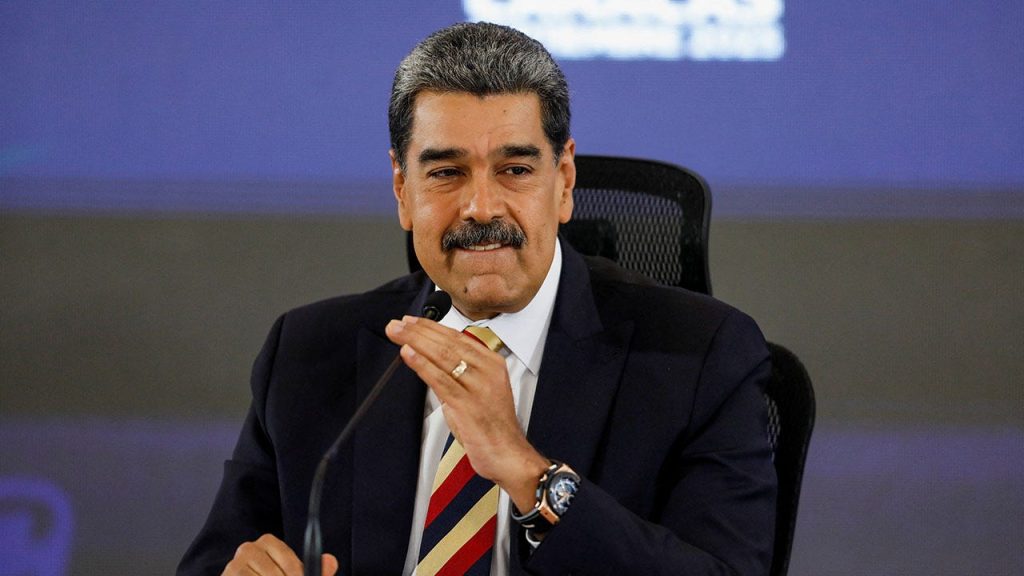Venezuela’s Maduro Accuses U.S. of Seeking Regime Change Amid Caribbean Naval Buildup
In a tense address to journalists, officials, and military personnel in Caracas, Venezuelan President Nicolás Maduro has forcefully accused the United States of attempting to orchestrate regime change in Venezuela through military intimidation. “They are seeking a regime change through military threat,” Maduro declared, his voice reflecting the growing tension between the two nations. This accusation comes in direct response to President Trump’s authorization of a naval buildup in the Caribbean, which the U.S. administration maintains is aimed at disrupting drug cartel activities as part of broader border security measures. Maduro’s concerns echo statements previously made by Venezuela’s representative at the United Nations, suggesting a coordinated diplomatic response from the Venezuelan government to what they perceive as external aggression.
The situation represents what Maduro characterized as an unprecedented threat to regional stability. “Venezuela is confronting the biggest threat that has been seen on our continent in the last 100 years,” he stated with evident concern, adding that “a situation like this has never been seen.” Despite the gravity of his assessment, Maduro projected confidence in Venezuela’s preparedness, asserting that the country is “super-prepared” and will not yield to threats. His defiant stance reflects the longstanding friction between Caracas and Washington, which has intensified significantly during the Trump administration. This latest development has further strained already fragile diplomatic relations, with China also condemning the U.S. military presence near Venezuela as foreign interference in regional affairs.
Behind the rising tensions lies a serious accusation from the Trump administration, which has publicly charged Maduro with participation in drug trafficking operations. This allegation has escalated to the point where the U.S. government has announced a substantial $50 million reward for information leading to Maduro’s arrest and conviction. This extraordinary step represents a significant escalation in U.S. pressure tactics against the Venezuelan leader, moving beyond economic sanctions and diplomatic isolation into the realm of criminal prosecution. The reward announcement has been perceived by many in Caracas as further evidence of Washington’s determination to remove Maduro from power by any means necessary, fueling the Venezuelan government’s claims of an imminent intervention threat.
The Pentagon has framed the naval deployment in terms of combating transnational criminal organizations rather than targeting the Venezuelan government directly. Chief Pentagon spokesman Sean Parnell emphasized during an August 19 news conference that drug cartels “have engaged in historic violence and terror throughout our hemisphere—and around the globe—that has destabilized the economies and internal security of countries, while also flooding the United States with deadly drugs, violent criminals, and vicious gangs.” This characterization positions the naval buildup as part of a broader security initiative rather than a Venezuela-specific operation. Parnell further indicated that addressing these threats “requires a whole-of-government effort” and coordination with regional partners, suggesting that the military component is just one aspect of a comprehensive approach to regional security challenges.
The current standoff reflects deeper geopolitical dynamics in the Western Hemisphere, with Venezuela becoming an increasingly significant focal point for competing international interests. China’s condemnation of the U.S. naval presence highlights the global dimensions of what might otherwise appear as a bilateral dispute. For Venezuela, already struggling with a profound economic crisis, hyperinflation, and humanitarian challenges, the perceived military threat adds another layer of complexity to its multifaceted problems. Maduro’s administration has consistently attributed Venezuela’s economic difficulties to external factors, particularly U.S. sanctions, rather than domestic policy failures. The naval buildup provides additional material for this narrative, potentially strengthening Maduro’s position among supporters who view him as defending national sovereignty against imperialist aggression.
The outcome of this confrontation remains uncertain, with significant implications for regional stability and U.S.-Venezuela relations going forward. The Trump administration’s combination of military pressure, economic sanctions, and criminal allegations represents a multifaceted approach to pressuring the Maduro regime. Meanwhile, Venezuela’s defiant stance and appeals to international allies suggest a government determined to withstand external pressure rather than yield to demands for political change. As naval assets continue to patrol international waters around Venezuela, both sides appear entrenched in their positions, with limited communication channels to defuse tensions. The situation underscores the complex interplay between counter-narcotics operations, regime change accusations, and sovereignty claims that characterizes contemporary inter-American relations, particularly when involving nations with fundamentally opposed political systems and ideological orientations.


